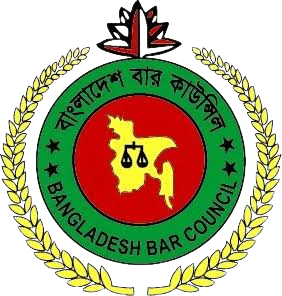Relevant Articles Regarding Bangladesh Bar Council Tribunals....................
| 33. | (1) |
The Bar Council may constitute one or more Tribunals and each such Tribunal shall consist of three persons of whom two shall be persons elected by the Council from amongst its members and the other shall be a person co-opted by the Council from amongst the advocates on the roll, and the senior most advocate amongst the members of a Tribunal shall be its Chairman. Provided that the Attorney General for Bangladesh shall not be a member of any Tribunal. |
||
| (2) | Notwithstanding anything contained in this Order: – | |||
| a) |
where any enquiry is pending before a Tribunal constituted under the Legal Practitioners and Bar Council Act, 1965(Act III of 1965), such enquiry shall be transferred to a Tribunal constituted by the Bar Council under clause (1) and thereupon such Tribunal shall proceed with the enquiry from the stage at which its predecessor had left it. |
|||
| b) |
where any enquiry is pending before a Tribunal constituted under this Order at the time of the expiry of the term of the Bar Council, such enquiry shall be completed and disposed of by that Tribunal; Provided that the Chairman of the Bar Council may, by an order in writing, direct that any such enquiry shall be completed and disposed of by a Tribunal constituted by the Bar Council under clause (1) and thereupon the enquiry shall stand transferred to such Tribunal which shall proceed with the enquiry from the stage at which its predecessor had left it. |
|||
| 34. | (1) |
In enquiries relating to conduct of advocates, a Tribunal shall follow such procedure as may be prescribed. |
||
| (2) |
The Tribunal shall fix a date for hearing of the case and shall cause notice of the day so fixed to be given to the advocate concerned and to the Attorney General for Bangladesh and shall afford the advocate concerned and the Attorney General an opportunity of leading evidence, if any, and of being heard before orders are passed in the case. |
|||

| (3) |
Notwithstanding anything contained in this order or any other law for the time being in force, the Chairman of the Tribunal may empower one of the members of the Tribunal to consider and decide preliminary issues and to record evidence. |
|||
| (4) |
On completion of the enquiry the Tribunal may either dismiss the complaint or, where reference to the Tribunal was made at the motion of the Bar Council, direct that the proceedings be filed; or it may make an order imposing any of the penalties referred to in clause (1) of Article 32. |
|||
| (5) |
Where the Tribunal makes an order for the suspension of an advocate from practice, it shall specify the period of suspension, and for that period the advocate shall be debarred from practicing in any court or before any authority or person in Bangladesh. |
|||
| (6) |
The Tribunal may make such order as to the costs of proceedings before it as it may deem fit; and where the Tribunal is of the opinion that a complaint made against advocate is false and vexatious, it may, in addition, and without prejudice to any other remedy available to the advocates, impose deterrent costs not exceeding a sum of five hundred taka upon the complainant, which shall be paid to the advocate as compensation. |
|||
| (7) |
Every order of the Tribunal as to costs or deterrent costs shall be executable as an order of the High Court. |
|||
| (8) |
The Tribunal may of its own motion or on application made to it in this behalf, review any order passed under clause (4) or (6) and maintain, vary or rescind the same, as it thinks fit. |
|||
| (9) |
When any advocate is reprimanded or suspended under this Order, a record of the punishment shall be entered against his name in the roll and when an advocate is removed from practice his name shall forthwith be struck off the roll; and the certificate of any advocate so suspended or removed shall be recalled. |
|||
| 35. | (1) |
For the purpose of any such enquiry as aforesaid, a Tribunal shall have the same powers as are vested in a Court under the Code of Civil Procedure, 1908 (Act V of 1908), in respect of the following matters, namely: |
||
| a) |
enforcing the attendance of any person, |
|||
| b) |
compelling the production of documents, and |
|||
| c) |
issuing commissions for the examination of witnesses: |
|||
|
Provided that the Tribunal shall not have power to require the attendance of the Presiding Officer of any Court save with the previous sanction of the High Court or, in the case of an officer of a Criminal or Revenue Court, of the Government. |
||||
| (2) |
Every such enquiry shall be deemed to be a judicial proceeding within the meaning of sections 193 and 228 of the Bangladesh Penal Code (Act XLV of 1860); and a Tribunal shall be deemed to be Civil Court for the purposes of sections 480 and 482 of the Code of Criminal Procedure, 1898 (Act V of 1898). |
|||
| (3) |
For the purpose of enforcing the attendance of any person or compelling the production of documents or issuing commissions:- |
|||
| a) |
The local limits of the jurisdiction of a Tribunal shall be those of the jurisdiction of the Bar Council; and |
|||
| b) |
A Tribunal may send to any Civil Court having jurisdiction in the place where the Tribunal is sitting any summon or other process for the attendance of a witness or the production of a document required by the Tribunal, or any commission which it desires to issue, and the Civil Court shall serve process or issue such commission, as the case may be, and may enforce any such process as it were a process for attendance or production before itself. |
|||
| (4) |
Proceedings before a Tribunal in any such enquiry shall be deemed to be civil proceedings for the purposes of section 132 of the Evidence Act, 1872 (Act I of 1872), and the provisions of that section shall apply accordingly. |
|||
| 36. | (1) |
Any person aggrieved by an order of a Tribunal under Article 34 may, within ninety days from the date of the communication of the order to him, prefer an appeal to the High Court. |
||
| (2) |
Every such appeal shall be heard by a Division Bench of the High Court which may pass such order thereon as it may deem fit and the order of the High Court shall be final. |
|||
| 37. |
The provisions of sections 5 and 12 of the Limitation Act, 1908 (Act IX of 1908), shall, so far as may be, apply to appeals made under Article 36. |
|||
| 41. |
Any person who is not an advocate and practices the profession of law and any person who is not entitled under this Order to practice in the High Court practices before that Court shall be punishable with imprisonment for a term which may extend to six months. |
|||

